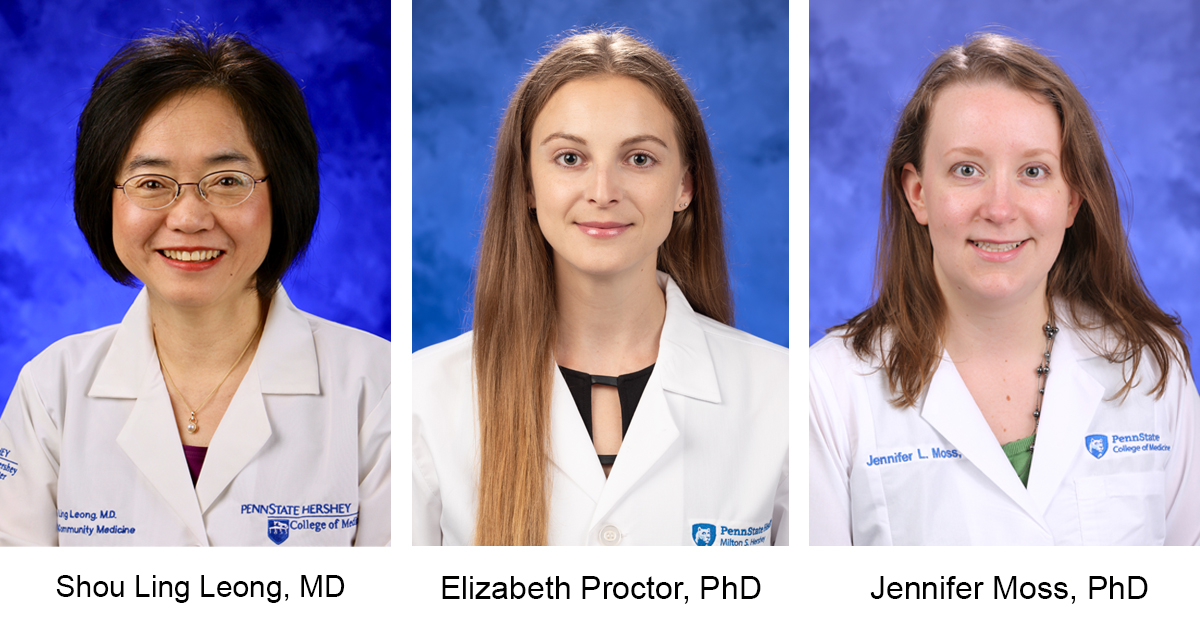Penn State College of Medicine celebrates three winners of Women in STEM awards

Three researchers at Penn State College of Medicine have won Whitaker Center’s Women of Impact: Celebrating Women in STEM Awards, which honor local women who have significantly advanced the fields of science, technology, engineering and mathematics and the central Pennsylvania community.
The recipients are:
Dr. Shou Ling Leong, assistant dean for Pathways Innovation and professor and associate vice chair for education, Department of Family and Community Medicine, was named a “Game Changer” in honor of her efforts to address growing physician shortages and rising student debt. Leong developed a program, called a “pathway,” where students can complete medical school in three years instead of four, accelerating the training of physicians in central Pennsylvania and nationwide.
“We customize each pathway in the three-year program” Leong said. “This individualization, combined with mentoring and coaching that carries from medical school through residency training, reduces stress and burnout in students and helps them become the best physicians they can be.”
Leong has also developed and served as editor-in-chief of Aquifer Family Medicine, a set of virtual patient cases professors use to teach the national clerkship curriculum. Most medical schools in Pennsylvania and across the country are now subscribers to these cases, which model how to think through patient encounters, ask the right questions and provide evidence-based, patient-centered care.
“Medical education should be dynamic” Leong said. “Curricular reform and innovation are just part of how we are re-envisioning medical education to meet the ever-changing health care needs of our communities.”
Elizabeth Proctor, who has a PhD in bioinformatics and computational biology and is assistant professor of neurosurgery, pharmacology, biomedical engineering, and engineering science and mechanics, also won the “Game Changer” award. She leads a laboratory at Penn State College of Medicine that focuses on systems biology as it relates to Alzheimer’s disease.
“Systems biology is the idea that everything in human health is a system of multiple, interacting parts,” Proctor said. “Seemingly small changes, even on a molecular level, can cascade into large changes that cause disease. The challenge is to pioneer the solution, analyzing the mass of data over multiple levels to extract meaningful information and construct an interacting system.”
Proctor is also committed to serving as a career and scientific mentor to young scientists, helping them in their early careers.
“Academia is a difficult road, and often a ‘black box’ for those who didn’t grow up in the know,” Proctor said. “I’m glad to provide the help I wish I had and share resources for success that were provided to me when I was walking these paths earlier in my career.”
Jennifer Moss, who has a PhD in health behavior and is assistant professor in the Department of Family and Community Medicine and the Department of Public Health Sciences, has been named to the “Women to Watch Class of 2021” for her research on rural health and cancer outcomes.
“Broadly speaking, rural communities have a higher rate of cancer,” Moss said. “Through our research, we are able to analyze large, national data trends and make them relevant to the community, improving care at the local level.”
Moss also strives to minimize the barriers to cancer prevention and treatment in rural communities.
“Living in a certain place shouldn’t mean you are more likely to get cancer,” Moss said. “We can work with health care clinics to make sure people have access to preventive care, diagnostics and treatment. We can also work with clinics, medical students, graduate students and clinicians to increase the promise of STEM to make our lives better, healthier and more equitable.”
The 2021 Women of Impact: Celebrating Women in STEM Awards Program will honor all award recipients at an event on Wednesday, Sept. 22. The event benefits the Whitaker Center’s Girls in STEM Initiative, which has engaged more than 4,000 young girls in STEM-related activities designed to build their confidence and interests.
If you're having trouble accessing this content, or would like it in another format, please email Penn State Health Marketing & Communications.
